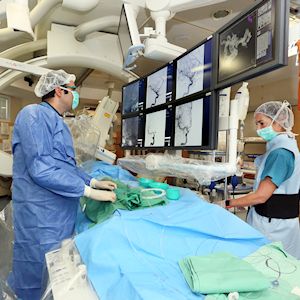News and Events
Rambam Doctors Rescue Turkish Seaman From Brain Bleed
The life of a Turkish seaman was saved after Israeli doctors performed an urgent brain catheterization and stopped the bleeding of an artery in his brain. The man's condition improved and he will be released in the coming days.
 Dr. Eitan Abergel performs a brain catheterization.
Photographer: Pioter Fliter
Dr. Eitan Abergel performs a brain catheterization.
Photographer: Pioter Fliter
The incident took place about a week ago. A fiftyish Turkish citizen who works on a container ship at the Haifa port had a severe headache. Following his complaints, he was taken off the ship and transferred to Bnai Zion Hospital in Haifa. A CT-scan revealed an extensive subcutaneous brain hemorrhage. This is a life-threatening condition, usually caused by brain aneurysms. Due to the severity of the man's condition, he was quickly referred to Rambam Health Care Campus, which has a special stroke treatment system used to treat various types of stroke, including subcutaneous hemorrhage.
To save the man’s life, Rambam’s medical team decided to perform a brain catheterization to block the aneurysm and prevent further bleeding. The team was faced with a huge challenged: the frightened patient spoke no Hebrew or English and did not understand what was happening. With the assistance of the shipping company for which the man worked, Rambam’s doctors obtained a telephone translator who was able to explain to the patient the seriousness of his condition and the need for urgent treatment. After much hesitation and expressing many concerns the patient gave his consent and the team began the life-saving procedure.
While under full anesthesia, Dr. Eitan Abergel, the Deputy Director of the Invasive Neurodermatology Unit at Rambam, performed a delicate cerebral catheterization; when he finished the bleeding in the patient’s brain was completely stopped. The patient is currently feeling well and being supervised prior to his release home in the next few days.
"The man was very lucky," says Dr. Evergal. "This is a medical problem that can be fatal and should be treated as soon as possible. Fortunately for him, he was close to land and close a hospital that was able to give him the necessary treatment. It was only because of that that his life was saved. At sea, his story could have ended quite differently. "

